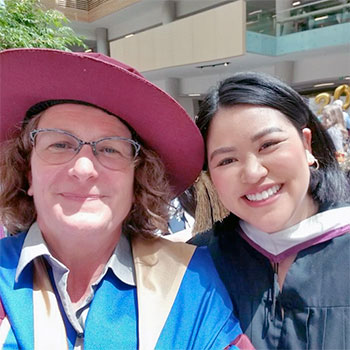"The program I attended was so unique because it allowed me to tailor my program specifically to my intersectional and multidisciplinary research interests in human rights, gender, immigration and settlement policy."
Lualhati Marcelino
Search for academic programs, residence, tours and events and more.
In our Master of Arts (MA) in Geography program you can benefit from the breadth and depth of the expertise of our faculty and your fellow graduate students in this rich intellectual environment. Our Geography MA program allows you to explore a range of research interests, from the analysis of pressing social and environmental problems to theoretical questions of philosophical and technical importance.
The MA in Geography program is ideal if you’re interested in human geography, environmental and resource management, or the societal applications of geomatics. We also offer a Master of Environmental Studies in Geography and a Master of Science in Geography.

Opportunities to do research in Canada or abroad.
Environmental Data Analytics field meets labour market demands for geospatial and data handling training.
Our program is enhanced by a number of research centres and groups.
The MA can be completed as a two-year degree with thesis, or via a major research paper option.
The thesis option requires you to complete three courses and the thesis. The thesis option is normally completed in six terms (two years).
The research paper option requires you to complete six courses and the research paper. The research paper option is normally completed in three terms (one year).
Students can choose to complete the Environmental Data Analytics (EDA) field over one year: two semesters of course work (six courses) and one semester of research placement.
The EDA field meets labour market demands for people trained in geospatial and data handling related to environmental change and related management, regulatory, planning and policy decision-making. The degree focuses on environmental analytics knowledge generation and dissemination applied to the private, public and non-profit sectors.
Faculty teaching in the MA in Geography support a wide range of research interests in human geography, such as:
Our program is enhanced by a number of research centres and groups, including:

"The program I attended was so unique because it allowed me to tailor my program specifically to my intersectional and multidisciplinary research interests in human rights, gender, immigration and settlement policy."
Lualhati Marcelino
Take the first step in your graduate education and apply to one of our graduate programs. Follow our three-step admission process — we’ll walk you through how to apply and prepare for your first day as a graduate student.
After you have submitted your OUAC application, paid the non-refundable application fee, and Laurier has received your application, you'll receive an email from gradadmissions@wlu.ca advising you to upload the additional required documentation to Laurier’s Online Registration and Information System (LORIS).
To be considered for any scholarships and/or awards, ensure your complete application is submitted through OUAC by Jan. 15. Please note, this process typically takes two weeks for supplemental materials and references to be uploaded. To avoid disappointment, apply early.
An application for admission to our MA/MES/MSc programs in Geography must include:
Visit our Graduate Admissions Toolkit for more information about applying.
Proficiency in written and spoken English is essential to graduate studies at Laurier. Applicants whose language of instruction during their previous postsecondary education was not in English must submit evidence of proficiency in English. If applicable, results from accepted testing services must be uploaded to LORIS.
Questions? Contact geoggradprogram@wlu.ca.
"The academic staff at Laurier is superb. The professors take pride in what they do and care about their students. I learnt lots from the professors, guest speakers and from my peers as well."
Hector Goldar (MA '17)
Regardless of the type of graduate degree program you intend to pursue, financial planning is important. At Laurier, we want to provide you with as much information as possible about a variety of scholarship and funding opportunities and equip you with the skills to manage your finances effectively in the years to come.

MA students who recently completed our program are currently employed by:
Additionally, some have gone on to further education, such as doctoral programs, teacher’s college and law school.
ASPIRE is Laurier's professional skills development training program for graduate students. The program helps you craft an individualized, extracurricular learning plan tailored to your professional journey and entry to the workplace.
Learn about the interests of our faculty members. If you are looking for more information about this program, have questions, or want to set up a meeting, contact a member of our team.
Alison Blay-Palmer
Professor
UNESO Chair on Food, Biodiversity and Sustainability Studies
Sean Doherty
Professor
Adrienne Johnson
Associate Professor
Christopher Lemieux
Associate Professor
John McMurry Research Chair in Environmental Geography
Sherri Longboat
Associate Professor
Robert McLeman
Professor
Steven Roberts
Associate Professor
Graduate Officer, Geography
Terah Sportel
Assistant Professor
Andrew Spring
Assistant Professor
Margaret Walton-Roberts
Professor
Brent Wolfe
Professor
Associate Vice-President and Dean, Faculty of Graduate and Postdoctoral Studies
Alex Latta
Associate Professor
Debora VanNijnatten
Professor